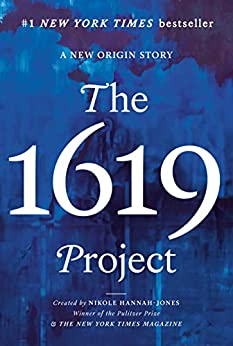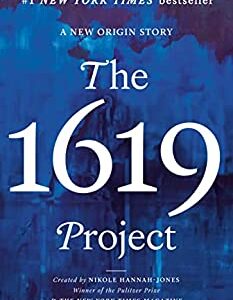These are the quotes I noted while reading The 1619 Project: A New Origin Story by Nikole Hannah Jones:
Preface
- Learning history made the world make sense. It provided the key to decode all that I saw around me.
- The histories we learn in school or, more casually, through popular culture, monuments, and political speeches rarely teach us the facts but only certain facts.
- While history is what happened, it is also how we think about what happened and what we unearth and choose to remember about what happened.
“The story of the master never wanted for narrators. The masters, to tell their story, had at call all the talent and genius that wealth and influence could command. They have had their full day in court. Literature, theology, philosophy, law and learning have come willingly to their service, and if condemned, they have not been condemned unheard.” – Frederick Douglas, 1892 autobiography
- Black Americans understand that we have been taught the history of a country that does not exist.
- History is molded by the perspectives of the most powerful members of society.
- White Americans desire to be free of a past they do not want to remember, while Black Americans remain bound to a past they can never forget.
Democracy
- Jim Crow did not end at the Mason-Dixon Line.
- The United States is a nation founded on both an ideal and a lie.
- While our nation’s founding documents were written in Philadelphia, they were mainly written by Virginians.
- During the Constitution’s ratification in the 1780s, a few bold Americans of both races sustained a new abolitionist movement. They considered the Constitution deceitful. “The words [are] dark and ambiguous; such as no plain man of common sense would have used.”
- “[Black soldiers in the civil war] expected that the brutality that accompanied the making of slavery would accompany its undoing.” – Thavolia Glymph
- “It was the poor white man who was freed by the war, not the Negroes.” – Waters McIntosh (Based on gains made during the short reconstruction period.)
- No one cherishes freedom more than those who have not had it.
Fear
- “Not everything that is faced can be changed, but nothing can be changed unless it is faced.” – James Baldwin
“’Give me liberty of give me death!” We heard that a slave owner named Patrick Henry said that in a speech he give to the other toubab. I laugh for two reasons. For one, he don’t know what he say to be an invitation for his own slaves to rise up against him.” – Robert Jones, Jr., Freedom Is Not for Myself Alone
Dispossession
- “I fought through the civil war and have seen men shot to pieces and slaughtered by thousands, but the Cherokee removal was the cruelest work I ever knew” – a Georgia militia man
Capitalism
- To this day, the fifteen states where slavery remained legal as of 1861 still hold the power to block a constitutional amendment supported by the other 35.
- Income inequality decreases where unionization increases, as a result of organized labor fighting for better pay for the rank and file and keeping employer power in check.
- The United States remains the sole advanced democracy missing a Labor Party.
- American freedom became broadly defined as the opposite of bondage. This had the effect of making “all nonslavery appear as freedom.” (economist Stanley Engerman)
Politics
- “It is more important for any community, anywhere in the world, to affirm and live by civilized standards, than to bow to the demands of numerical majority.” – William F. Buckley, Jr.
Citizenship
- Ambivalence about Black citizenship persisted – 3 of the 4 slaveholding border states that remained in the union did not ratify the 14th amendment until years after it was proposed and accepted by other states – as many as 100 years later.
Self-Defense
- One Virginian wrote in the local newspaper, “we must re-enact all those rigorous laws which experience has proved necessary to keep slavery within bounds. In a word, if we will keep a ferocious monster in our country, we must keep him in chains.”
- John Adams wrote, “It would be a miracle if such heterogenous ingredients did not at first produce violent fermentations.”
Punishment
- The race of the victim is the greatest predictor of who gets the death penalty in the United States.
- In 2008, all of the 13 and 14 year old children in this country sentenced to life in prison without parole for non-homicide offences were Black, Latino, or Native.
- By 1729, Maryland law had authorized punishments of enslaved people including “to have the right hand cut off… the head severed from the body, the body divided into 4 quarters, and head and quarters set up in the most public areas of the county.”
- After emancipation, Black people, once seen as less than fully human “slaves,” were now seen as less than fully human “criminals.”
- Anything Black people did to challenge the racial hierarchy could be seen as a crime.
- People are wrong when they reduce human beings to nothing more than their worst act.
Inheritance
- “This is a country for white men, and by God, as long as I am President, it shall be a government for white men.” – Andrew Johnson
Church
- “If we do not act, we shall surely be dragged down the long, dark, and shameful corridors of time reserved for those who possess power without compassion, might without morality, and strength without sight.” – Martin Luther King, Jr.
Music
- In the early 1920s and 30s, white American’s principal hunger was for secondhand Blackness.
- Loving Black culture has never demanded a corresponding love of Black people.
Justice
- Origin stories function, to a degree, as myths designed to create a shared sense of history and purpose.
- “With no sacredness of the ballot there can be no sacredness of human life itself. For if the strong can take the weak man’s ballot, when it suits his purpose to do so, he will take his life also.” – Ida B. Wells
- We are often taught that Lincoln “freed the slaves,” but we are not prodded to contemplate what it means to achieve freedom without a home to live in, without food to eat, a bed to sleep on, clothes for your children, or money to buy any of it.
Noted Works of Art:
- “American Heartbreak: 1619” – Langston Hughes
- “Freedom Is Not for Myself Alone” – Robert Jones, Jr.
- “proof [dear Phillis]” – Eve L. Ewing
- “Before His Execution” – Tim Seibles

